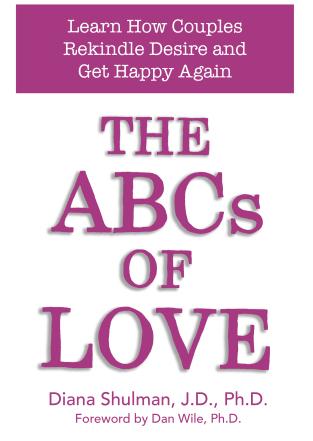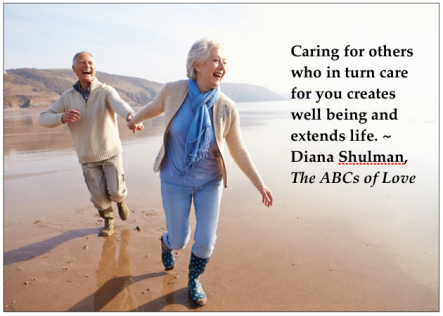 Reading The ABCs of Love may be the most loving thing you can do for yourself and your partner.
Reading The ABCs of Love may be the most loving thing you can do for yourself and your partner.
It supports you in transforming your relationship: if it’s already great, then it will help you make it even better, and if you’re stuck, or suffering, then it will be show you how to turn things around.
If you’re not as happy as you’d like to be in your relationship, you may think that you or your partner – or both – have fallen out of love. But this book shows you how, most likely, you’ve simply fallen into bad or just repetitive habits. And it provides advice on the new habits you can adopt to prevent relationship problems… savoring what’s good and fixing what’s not.
The first chapter in The ABC’s of Love is Attachment and the last is Zest, so you see where this is going and how many suggestions Diana Shulman offers to keep your motivation strong.
For example, what is your style of attachment? Are you, e.g., an Approacher or an Avoider? Knowing yourself and your partner’s styles of relating can help foster better relationships. Diana Shulman recommends celebrating our differences, developing compassion, patience and respect for each other… so you can live your life to its fullest.

The chapters are short and full of insight, lessons, and entertaining and insightful examples from the author’s marriage in applying her own lessons and those culled from experts in couples counseling.
Author Diana Shulman, J.D., Ph.D., is a psychoanalyst in Los Angeles with more than 25 years of clinical experience after practicing law for 10 years. Here, she answers my questions about The ABCs of Love:
INTERVIEW WITH AUTHOR DIANA SHULMAN:
Who can most benefit from reading The ABCs of Love?
The ABCs of Love is a self-help book for anyone in a relationship regardless of milestones, age, or sexual orientation. Readers will find everything they need — quite literally, from A to Z — to avoid the landmines, repair wounds (both old and new), rekindle desire, and get happy again. So whether you’re young or old, dating, or about to celebrate your 50th anniversary, the vignettes, tools, and skill-building exercises in the book can help readers create the relationship of their dreams.
What is the most effective way for the reader to use this book to improve their relationship?
I recommend couples read the book from beginning to end and then zero in on the chapters and exercises they found most helpful, keeping in mind there’s no such thing as perfect. Fights are normal. All couples fight, some more unproductively than others, of course, but we all fight. In fact, what distinguishes successful from unsuccessful couples is repair — the willingness to look, learn, and promise to do better. The ABCs of Love is all about how to do this.
I really like the TRY THIS feature at the end of each chapter. Do couples need to answer the questions together?
Couples don’t need to do the Try This exercises together but if they can put their heads and hearts together to discover ways to get things going in a better direction, it’s a real plus. Having said that, if one partner reads the book and starts making improvements, it’s going to help the relationship. As you might expect from.the title, the topics are presented in alphabetical order starting with “Attachment” and ending with “Zest.”
In Chapter F for Feelings, you cover how we deal with emotions. What would you say is the best way to handle them?
Emotions are sometimes compared to ocean waves and for good reason. They’re natural and powerful as they reach a peak and flatten out with a noticeable ebb and flow. Letting emotional waves pass through you from beginning to end isn’t about losing your temper or non-stop weepiness. Instead, it’s about slowing down, mindfully noticing bodily sensations, perceptions, and impulses as the energy rises and falls. If you take the time to let a feeling do its thing, options open up, angles you’ve never considered enter your mind, and new strengths begin to emerge.
When handled effectively, our emotions are a vital part of an internal guidance system. They help make us better decision-makers. While all this sounds commonsensical, as though it should be effortless, most of us are afraid of certain emotions. We don’t want to explore their energy; we want to avoid it. It’s what we learned and what we’ve always done, but given the downside of turning away, I say it’s time to try something else. Many of the exercises in the book are designed to help couples do just that and start growing again.
Can you explain The S.U.R.E. Thing to lessen negativity in a relationship?
The S.U.R.E. Thing is an acronym I came up with to help couples slow down and think before lobbing the next conversational grenade. It’s about reminding yourself that your partner has an understandable point of view — even though you don’t agree with it. Here are the four steps of The S.U.R.E. Thing:
S is for Slowing your breathing to calm your brain so you can think more clearly.
U is for Understanding your partner’s points or feelings by focusing on what makes sense (you may not like what your partner is saying, but it still makes sense).
R is for Reflecting back what you heard to show you’re tuned in, “It makes sense to me that…”
E is for showing Empathy. “This has been difficult. I’ve made it worse, and I’m sorry.”
Witnessing each other is calming as opposed to infuriating. If you hold back on speaking until your partner shows signs of feeling heard, you’re in for a treat. By waiting your turn, you create a real chance of having an audience when you continue the conversation.
What overall message would you like readers to take away from The ABCs of Love?
I hope readers will see their recurring conflicts as a doorway into closeness and connection. Whether dramatic or born of something more routine, these are the moments, brief or drawn-out, when we feel dismissed, attacked, ignored, or shamed. Revisiting moments of disconnection and conflict can be a gift, a passageway into healing, provided we do it wisely — meaning explore what happened with an eye toward the future and the past, an ear for both words and feelings, and an ever-growing awareness of blind spots, hot buttons, and mistaken assumptions. If we fail to do this, the gift goes unopened and will soon be forgotten, ensuring more of that pointless back and forth we know all too well.
How can readers connect with you?
Readers can find me on Facebook at https://facebook.com/ABCsOfLove and at my website: www.dianashulman.com
The ABCs of Love is available at Amazon.com.
Namaste!
Becca Chopra, author of The Chakra Diaries, Chakra Secrets, Balance Your Chakras-Balance Your Life, and The Chakra Energy Diet
